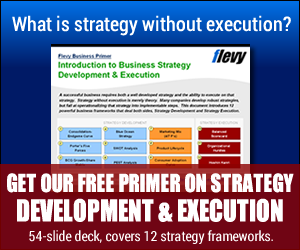The idea of doing ‘strategic project management’ may sound appealing. It has a buzz to it!
But what exactly is strategic project management? This post explores the essentials strategic project management.
What Strategic Project Management Could Be
 When we start a project, we begin by asking what it is all about, what is to be accomplished, and…WHY! That ‘why’ part is critical, as it provides an insight into how project success or failure will be measured.
When we start a project, we begin by asking what it is all about, what is to be accomplished, and…WHY! That ‘why’ part is critical, as it provides an insight into how project success or failure will be measured.
Many projects, however, miss this point. The ‘why’ may have been considered before the project was given life and funded, but it may not have been communicated well. Worse yet, the ‘why’ may not have even been conceptualized clearly, or the business case built effectively; it may not be a good strategy! Projects need a strong and clear ‘why’.
This brings me to what strategic project management could be: a strategy for getting the project done. At the inception of the project, in my experience, the primary focus is usually on ‘how’ we can get the project done successfully.
This is a viable, important, and completely valid approach. It gets many projects off to a good start. But you can have a good strategy for getting the project done without truly understanding the strategic underpinnings of the project.
A Deeper Understanding of What ‘Strategic’ Is
To get a deeper understanding of the ‘why’ – the strategic underpinnings of the project – you need to keep asking why. And actually there’s a lot more to it than that. You need to probe to understand the bigger picture. You can do that by asking more questions, such as:
- What is the problem to be solved by this project?
- How will we measure the project’s success (regardless of meeting schedule, cost, and quality parameters)?
- What assumptions were made in determining the strategy that resulted in this project?
- How will various stakeholders measure the success or failure of the project?
- Are there some unanswered questions that need to be considered before proceeding?
There are many more questions that you could ask. As with project management frameworks like the Project Management Body of Knowledge (PMBOK) Guide, ‘strategy’ is a subject ripe with many foundational frameworks that can help you to ask the right questions for the situation.
What Is Not ‘Strategic’
The word ‘strategic’ is often misused and misunderstood. For example, the term ‘strategic initiative’ is a frequently used term that often is not accompanied by the true underpinnings of the strategy itself. For example, an organization may have a strategic initiative to streamline the supply chain, but the underpinnings of the strategy may include such things as technology enablement, competitive pressure, financial attractiveness, and other factors that answer the ‘why’.
Most things have the potential to be strategic, but are not necessarily thought about or executed in a strategic manner. For example, an organization’s human resources policy can be – and should be – aligned with the organization’s strategy. That makes it strategic in nature. However, it may not be crafted in that way, and may be ad hoc based upon past practices and experience. Thus, the human resources policy may or may not truly be strategic. It is the rigor in putting together a viable strategy and aligning initiatives with that strategy that make something strategic.
Projects are initiatives that need to be strategic. If they are not, they run the risk of not accomplishing anything for the organization. They may be on schedule, within budget, and to the specified quality standard but not accomplish anything. Without tying the project to something strategic, it’s success is left to chance.
The Essentials of Strategic Project Management Defined
—————————————-
I recommend these PM templates (paid link):
—————————————-
Strategic project management occurs when the project success is measured by factors that map back to the strategy. Here are some situations where this can happen:
- To answer a question and learn – It may be that, in the process of crafting the strategy, it is decided that it is important to answer a particular question. It could be the viability of a product, promise of a new technology, the potential of a new policy, or many other things. Sometimes a project is not there to necessarily make money unto itself; its purpose may simply be to answer a question that clears the way for more initiatives that will be beneficial. Assuming clarity of the question, success is measured by the clarity with which the project answered the question.
- To progress toward a solution – Research and development projects are a prime example of this. The product of the project may be to take what has been learned to date and progress it further in a specific direction. Success is measured by how well the project moved things in the specified direction.
- To improve a process – There might be a process that currently is unwieldy and inefficient, and the project has been devised to fix that. Success may be measured by decreased cost of the process, increased speed, quality improvements, ease of use, or other attributes.
- To build a capability – This can be tricky in that it is not improving something that already exists, but creating something new within the organization. Building a new plant, or adding certain equipment, can be part of the project. It will surely also include training of personnel, creation of new processes, and other things that will support the new capability. The key is to understand the reason for adding the capability, including the desired results. Success is measured by factors determined to measure the maturity of the capability, as well as measurements that tell you whether the new capability bears fruit as desired.
- To comply with a regulation – This is a necessity in most cases. It is important to develop a clear understanding of the need, and to spend efficiently in the satisfaction of the need. Success will be measure by the degree to which execution of the project results in verified compliance with the regulation.
Essential Actions for a Strategic Project Manager
This post sought to explore some ideas about the relationship between strategy and project management – the essentials of strategic project management. From exploring the essentials, I would conclude that strategic project management occurs when the success of the project is determined by measuring the project’s output against the strategic purpose of the project – the ‘why’ of the project.
The action for any strategic project manager is to strive to connect your project to the strategy it is supporting, in every area possible. As a starting point, devise at least one success metric for the project that maps back to the organization’s strategy.
—————————————-
I recommend these strategy resources (paid link):
—————————————-

